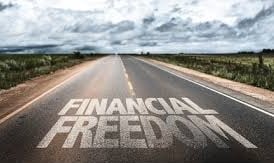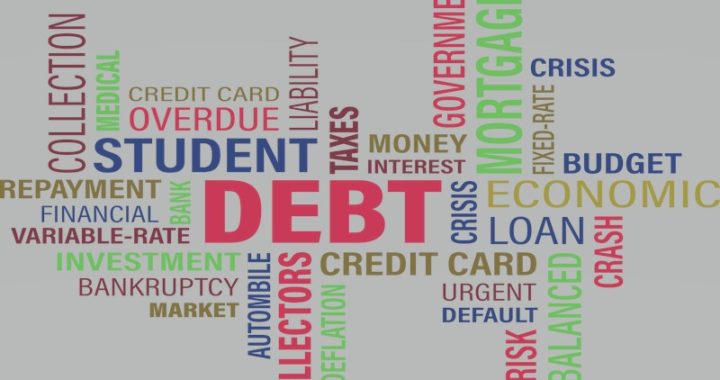Your Path to Financial Freedom

Most of us do not have money problems. What we do have is a money management problem. We do not have a lack of sufficient income as much as we have a lack of knowing how to manage our money or knowing how to modify our ‘perceived needs’ to what we can afford.
Our worldly thinking is along the lines of, it’s my money and I will spend it how I like. The world also teaches us to get into debt to fund our lifestyle with no thought to saving or giving.
The good news is that your path to financial freedom is not complex. I’m not saying it is easy, but following the steps outlined is one way to improve your financial position.
I will give a very brief summary of my path to financial freedom. I grew up in a home where we had enough to have a small home, food and clothes but little in the way of luxuries. I worked part time and took out student loans to fund my university education. During my career I was well paid and enjoyed the ‘high’ of buying things for myself (mostly electronics). Fortunately I did not get into large debt, but could easily have done so. After 10 years of this lifestyle, I approached a financial adviser to help plan what my future might look like. The first question they asked me was did I have a budget. I had no idea of how much I spent on what. I started tracking my expenses (daily) and then set a budget. My new ‘high’ now is succeeding at spending less than my budget. The end result is that I have now reached a position where I have the financial freedom to decide whether to work for money or non-profit.
So what is the secret?
It is an easy five step process:
- Complete a budget and track your expenditure.
- Work on your mindset change and learn to live on less and be content. You will get used to it.
- Avoid ‘bad debt’, paying interest steals your money and lines the pockets of financial institutions.
- Invest for a rainy day and long term goals.
- Adopt generosity, you have reached financial freedom when you can help others financially.
1. Budget and Track Expenditure
Most advisers will tell you that the starting point is to complete a budget. I would echo this advice but add that you should start recording your expenses daily. This will help you understand what you are spending and form input into your budget.
Completing a budget will take time (weeks) and you will continue refining it over a period of months. Over time you will get it down to an art form. When I first started, I had no idea how to complete a budget because I did not know how much I spent on what. Using bank statements I started completing a budget with my known regular income and expenses. I also started tracking all my expenses daily (every cup of coffee) which over time allowed me to update the budget with all those incidental expenses that seem invisible. This might all seem tedious, hard work, but for me I now receive a new greater ‘high’ from trying to spend less than my budget rather than the ‘high’ when I buy something. Tracking expenses is a bit like wearing a walking tracker. If you wear one you tend to walk more. If you track your expenses, you tend to spend less.
It is difficult to make changes until we have visibility of reality. If at this point you see that you are spending more than you earn, don’t panic. You are no worse off than you were, but at least know you know the extent of the problem. Once you know what you earn and what you are spending, you can start the process of working through options to either earn more, spend less or a bit of both. We are looking to get to a position where we earn more than we spend which gives us choices. It is what you do with these choices that sets you up on a path to financial freedom.
I have found the 50-30-20 budget useful for planning my expenditure. Under this model you spend:
50% on your needs. These are the costs for you to live, like a roof over your head, food in your mouth, electricity, hot water, transportation, credit card and loan repayments etc.
30% on your wants. These are the things that we enjoy but, let’s face it, could go without if we had to. Things like entertainment and holidays away.
20% is for your savings and giving goals. Initially your situation may require this for debt reduction. Once that is achieved you can focus on building savings for a rainy day and once that is achieved on long term investments. Save 10% and give away 10%.
Earn more – Can you work more hours or get another part time job for a while? Can you rent out a room in your home or rent out your garage? Do you have surplus items that you can sell? Get creative.
Spend less – Go through the list of each of the items you spend on. See where you can either:
- Cut out the expense, i.e. go without (no more take away meals)
- Cut back on the expense, i.e. do it less often (one takeout coffee a week rather than everyday)
- Substitute the expense, i.e. replace with a less expensive option (get Netflix rather than go to movies)
Depending on your situation, you need to be ruthless. A lot of what we spend on is to keep up appearances. It has nothing to do with our real need. I believe that we are able to change our perceived needs. Daily take away coffees seem to be a big part of our lifestyle in Australia. Yes it is nice, but is it a need? You will spend more than $1,000 per year on just one cup of coffee 5 days a week.
Live below your means
Common wisdom tells us to live within our means. I challenge you to live below your means. With the 50/30/20 budget you try to live on only 80% of your income. This might seem impossible. As you follow the steps to financial freedom, you can start saving. It might start with saving 1%, for most of us though we can eventually get to saving 20%.
I further encourage you to save half (10%) for a long term savings goal and give the other half (10%) away. The principle of generosity will help set you free from the ‘love of money’.
We are surrounded by so many opportunities to spend money that most people in the developed world still live from paycheque to paycheque. On that basis we are poor. Not poor on the basis of the money we earn, but poor because we lack the option for choices. Most people would be in serious trouble within 30 days if they lost their job. As I applied the principles of the path to financial freedom I set a goal of saving enough to get me through a 6 month period without a job. During the financial crisis of 2008, I faced this exact scenario. I ended up without a job for 8 months and only just got through using my savings and with a little help from Centrelink (Australia’s welfare system).
2. Mindset Change
You are not a victim of your circumstances. I define poverty as the lack of choice. For most us, we have the option of choices that define what the future will look like. I acknowledge that some have more choices than others, but we all can apply a mindset change that will set us on a path to financial freedom.
The bible tell us that the love of money is the root of all evil. It is not money that is the problem, it is the love of money. Does any of the following sound familiar:
- It’s my money and I will spend it how I like.
- I don’t have enough, I can’t afford to give to anyone.
- I pay a lot in taxes, so the government should look after me.
- Debt is both normal and necessary in this modern age.
Changing your mindset from what you lack (greed) to what you need and how you can be generous with what you have will set you on the path to financial freedom. If you know Jesus, you will know it is God’s money and he will provide for your needs.
Part of our greed comes from ‘keeping up with the Joneses’, you feel better about yourself simply because you feel that you are doing better than your friends and neighbours. You define ‘victory’ not by whether you feel secure in your financial state of your life, but by how much better you are doing than others.
And really, none of that kind of thinking is something that is possible to eliminate in others. You only have control over yourself. So one thing you can do is take a long look at yourself and decide what is it that will give you that security that you need, and can you learn to be satisfied with that. It would be helpful if you stop worrying about just how well others are doing. Just because someone else is doing better than you, doesn’t necessarily mean that you are doing badly. Stop thinking in terms of ‘if he does well, that means I’m doing worse’, or that ‘if he gets an in-ground swimming pool in his back yard, then I ought to have one also’.
3. Avoid ‘Bad Debt’
Consumption in today’s society consists of people buying things they don’t need, with money they don’t have, to impress people they don’t like”.
Clive Hamilton, Author – Affluenza
Debt is a thief, it steals from your future. Debt is consuming tomorrow’s income today. Debt is destroying the economies of the Western World with unprecedented debt levels amongst households and Governments. Australia has the second highest household debt level in the world at 120% of GDP as at October 2019. Arguably, Government debt level is not too bad by world standards. As at 6 March 2020, the gross Australian government debt was $573.1 billion which is edging towards 45% of GDP. This will however increase rapidly following some far reaching economic measures that the Government has implemented as a response to Covid19.
How will it ever be repaid? Answer: It won’t! Sadly so many families, businesses and Governments have fallen for the world’s lie, that debt is necessary in order to maintain a certain standard of living.
Ask Yourself:
- Do I really need this debt, or the asset that it allows me to own?
- Can I realistically repay it within a reasonable timeframe?
- What motivated me to get into debt? Did I do it for sensible reasons?
Here is a blueprint for getting out of debt:
- Make a list of all your debts
- Put them in order from highest interest rate at the top, to the lowest interest rate at the bottom. Then put them in dollar size order with the smallest (but highest rate) at the top, and then largest (but lowest rate) at the bottom).
- Pay off the smallest debts with the highest rate first (most likely a credit card) and work your way down.
- Celebrate each debt that has been paid off! Ideally not by spending more on your credit card!
- Check your Budget and use it to determine:
- What areas are wasteful and can be cut out
- What additional repayments you can make against your debts
Avoid ‘bad debt’, paying interest steals your money and lines the pockets of financial institutions.
4. Save and Invest
It is said that ‘Nothing occurs more often that the unexpected!’ When it comes to money, it is inevitable that you will have unexpected expenses on a periodic basis.
Here is my question for you. If you lost your job tomorrow, how long could you maintain your living standards for without having to borrow or to rely on either Government or family support?
Sadly for the majority of people the answer is just a few short weeks. A 2017/2018 ABS survey found that 50% of Australians had less than $7,000 in the bank.

As you might expect, working households on lower incomes tend to have less in the bank. Among working households in the bottom fifth of household income, the median total bank account balance is just $1,350. For households in the top fifth of the income distribution, the median is $24,400 in the bank.

Half of working households have 5.6 weeks’ income or less in the bank. Everybody’s circumstances are different but I would strongly encourage you to work towards having 26 weeks (6 months) savings available to cater for the unexpected.

So, we have established that most of us do not have sufficient savings to see out more than a month with no income. How do you go about saving? Where do you put your money?
There are no easy answers and a financial advisor would be best placed to help you. I encourage you to remember that:
- Compound interest is your friend (earning interest on interest). Over time a small regular deposit will grow.
- A large number of people might be asset rich but have no liquidity and so will be in trouble without an income. Ensure that you invest at least a portion in liquid assets.
- Depending on your stage of life you should consider the level of risk you are prepared to take and your investment horizon (how long will you invest for). Higher risk usually results in higher return but you need to be in for the medium to long term to ride out the ups and downs.
5. Adopt Generosity
During my last year at University my part time workhours were reduced significantly. This left me unable to afford my rent. Luckily I was taken in by a young church couple who provided me with accommodation and meals for a token monetary contribution. They were not well off, but their generosity was overwhelming. This act of generosity saved me thousands of dollars. I now pay it forward by ensuring that we have a spare bedroom to help someone in need.
So why is giving so important?
You can’t take it with you – Learning to experience joy through someone else’s joy enriches your life. So, share in others’ joy and more importantly, give generously to others to create that joy for them.
Generous people are happier – It’s no accident that “miser” and “miserable” come from the same root word. People who hold tightly to money find themselves friendless and alone. Money doesn’t give you morals, it just magnifies the morality you already have. If you’re a selfish hoarder with little, you’ll be a miser with millions. If you’re generous when you’re broke, you’ll be a philanthropist when you’re wealthy.
Practical tips
Get out of debt!! – Follow the steps listed to get yourself out of debt. It is difficult to be generous when you are under a cloud of debt.
Make generosity a priority in your budget – John D. Rockefeller, America’s first billionaire, said “I never would have been able to tithe the first million dollars I ever made if I had not tithed my first salary, which was $1.50 per week.” I’ve heard people say, “I can’t afford to give while I’m in debt.”
In my experience, I can tell you that it’s rare to find a couple who can live on 100% of their income who genuinely can’t live on 90% of their income. I encourage you to make giving a priority in your budget, even when you’re getting out of debt.
Generosity and wealth
Building wealth shouldn’t be an end in itself. It should be the means to facilitate incredible generosity. You will likely earn millions of dollars over the course of your life. What do you want your legacy to be? Wouldn’t you love to be able to experience the joy that comes from making others’ dreams come true?
Get out of debt and look for ways to give your time, talent, and treasure to others. Your contentment will give you incredible peace.
Adopt generosity, you have reached financial freedom when you can help others financially.




 Debt Reduction – Your Options
Debt Reduction – Your Options  Managing Your Money
Managing Your Money